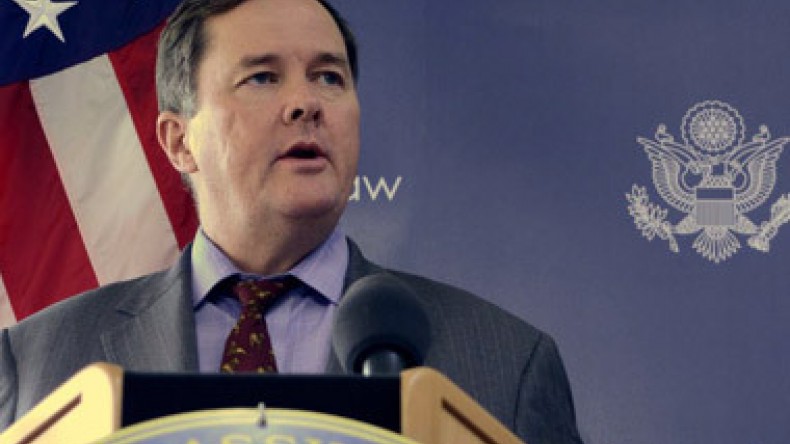
Helsinki Commission called on Baku to fulfill its obligations in human rights' sphere, instead of slipping into authoritarianism
The US Congressional Commission on Security and Cooperation in Europe, known as the Helsinki Commission, June 11, strongly urged the Azerbaijani government to fulfill its obligations on human rights and greater democracy, instead of heading further towards authoritarianism, the Azerbaijani news agency Turan reports.
Senator Benjamin Cardin, a Maryland Democrat and chairman of the Helsinki Commission, stated Washington has significant concerns regarding Azerbaijan's domestic political situation, which, as Senator Cardin put it, "is troubling because Azerbaijan is moving in the wrong direction." According to the Senator along with the consistently seen problems with freedom of the media and association, last two years have marked a high number of arrests and convictions of activists that had all been the hallmark signs of politically motivated prosecutions.
"Our concern is that rather than working to live up to its commitments in the OSCE and the CoE, Azerbaijan is instead heading towards greater authoritarianism,” Benjamin Cardin stated and added that the U.S. wants to see a stable and prosperous Azerbaijan. But absent real democratic progress, there will not be seen true stability and development there.
Speaking in front of the commission Deputy Assistant Secretary of State Thomas Melia, who has been refused to enter Azerbaijan last September, underlined the importance of the democracy in dialogues between the two countries, saying that he "would like to visit Azerbaijan again soon to continue these dialogues"
According to Melia the situation of civil liberties in Azerbaijan has steadily worsened over the past five years and continues to deteriorate. In 2009, it was already difficult for advocates of democratic reform - especially opposition political parties - to participate in the political life of the country, but it was still possible for NGOs and independent activists to operate.
As Melia notes, the situation has worsened significantly since then while the suppression of peaceful dissent increased in 2011, with the arrests of young Azerbaijani activists who sought to organize peaceful pro-democracy rallies in Baku. Since early 2013, the space for peaceful dissents has narrowed more dramatically, and the exercise of fundamental freedoms has become still more tenuous. A number of leading peaceful democracy advocates, civil society activists, and journalists have been incarcerated.
"Restrictions on the ability of selected Azerbaijani activists to travel outside of the country are also a problem, calling into question the extent of the government's commitment to freedom of movement, a founding tenet of the OSCE," Melia said, reminding, that since 2006, the government has prevented the foreign travel of Popular Front Party Chairman Ali Karimli by refusing to renew his passport.
"Today in Bern, the OSCE's Office for Democratic Institutions and Human Rights is discussing the important role of human rights defenders in OSCE participating States. Unfortunately, one of Azerbaijan's leading human rights defenders, Leyla Yunus, was unable to attend the event, because Azerbaijan's authorities confiscated her passport - as well as her husband's - in April. On April 19 well-known journalist Rauf Mirkadirov was arrested. All three have been strong proponents of people-to-people diplomacy, which helps build ties between Azerbaijanis and Armenians and is crucial to the peaceful resolution of the Nagorno Karabakh conflict," Melia noted.
In his speech Eric Rubin, deputy assistant secretary of state in the Bureau of European and Eurasian Affairs, underscored Azerbaijan's positive security and energy cooperation with the west, adding, that U.S.'s strongest relationships across the globe are with democracies and the human rights of their citizens.
Dr. Miriam Lanskoy, director for Russia and Eurasia, National Endowment for Democracy, emphasized that the oil-reach country leadership "changes the subject" of human rights to divert attention away, "no follow through" on commitments to OSCE.
Nevertheless Azerbaijan is about to host the OSCE PA at the end of the month. Despite participation in these international forums, over the last decade freedoms in Azerbaijan have declined substantially. Overall, the country has gone from semi-free to state of consolidated authoritarianism.
According to her recent events in Ukraine have major implications for Azerbaijan, and are seen as part of the reason that the crackdown on government critics has continued. The climate has also become much more difficult for the NGOs.
Azerbaijan should be bringing its legislation in compliance with ECHR and Venice Commission opinions rather than imposing even greater burdens on NGOs, believes the representative of NED.
Agency notes that the Azerbaijani Ambassador to the US refused to attend the hearing, bringing a reason that he had other meetings on the security front.
Eric Rubin, deputy assistant secretary of state in the Bureau of European and Eurasian Affairs touched upon the Nagorno Karabakh conflict settlement in his speech.
As it is noted on the official site of Helsinki Commission Eric Rubin said the United States is working diligently to facilitate a peaceful settlement to the Nagorno Karabakh conflict.
“We are focusing on pragmatic steps to bring the sides into negotiations on a peace agreement based on the core principles of the UN Charter and the Helsinki Final Act. We hope the presidents of Armenia and Azerbaijan will agree to meet in the near future to continue the constructive dialogue begun at their summit last November. It also is important that both governments support Track II efforts to build people to people contacts between Azerbaijanis and Armenians. These kinds of confidence building measures can help to prepare citizens of both countries for peace,” Rubin said.
He also noted that the U.S. is troubled by the recent 3 arrest of well-known journalist Rauf Mirkadirov, the subsequent investigation of Leyla Yunus and her husband Arif Yunusov. All three have been strong proponents of the Track II process and the Azerbaijani government’s actions will have a chilling effect on any contact between Azerbaijanis and Armenians.
Newsfeed
Videos






























